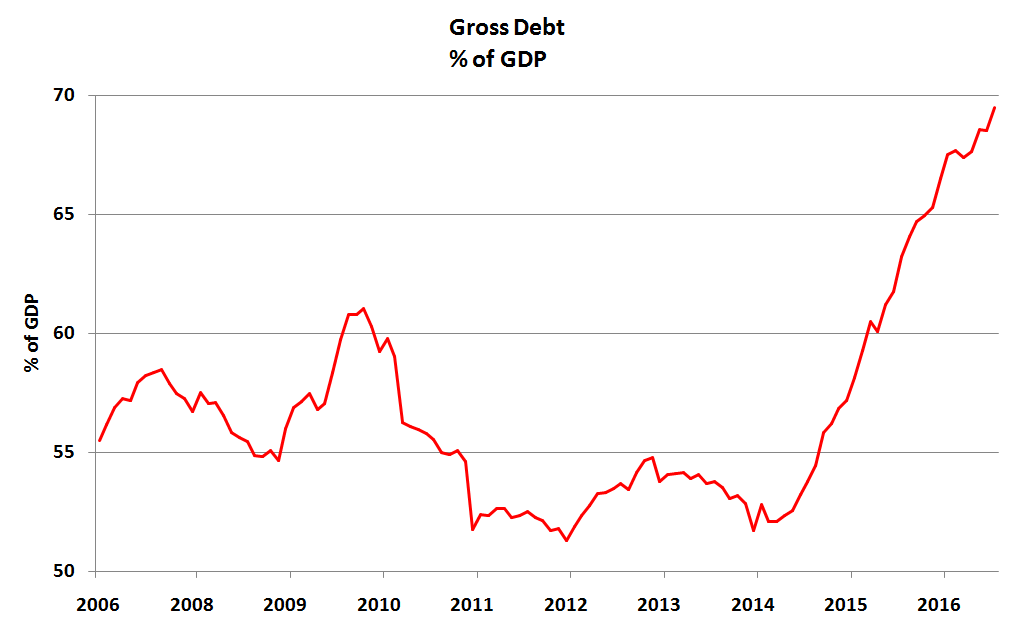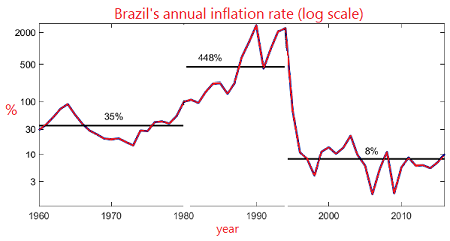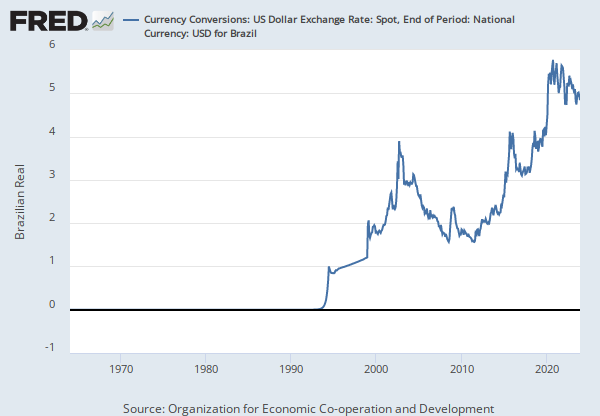Adminović έγραψε:Προέλλην έγραψε:Φυσικά και τα πάει καλύτερα η Βραζιλιά, όντας τα καλύτερα μνημονιακά παιδιά. Αντίθετα, Η Αργεντινή με τον ψεκ αντιμνημονιασμό, σέρνεται ακόμη.
ΥΓ
Για λιμάνια είπαμε, με σημαντική διεθνή κίνηση, όχι για μεγαλούτσικες μαρίνες.
Α, ο Λούλα είναι μνημονιακός υποτίθεται;.gif)
Κατ αρχάς, στη λίστα που μας έβαλες, το Νο1 και το Νο20 είναι της Βραζιλίας και η πλεονεκτούσα -υποτιθεται- Αργεντινή έχει μόνο το Νο9.
Κατά δεύτερον, η κίνηση ενός λιμανιού είναι συνάρτηση πολλών παραγόντων και δεν σημαίνει ότι απαραίτητα εξυπηρετεί τις ανάγκες μόνο της χώρας όπου βρίσκεται (δεν φαντάζομαι να νομίζεις ότι τα λιμάνια του Παναμά με την τεράστια κίνηση εξυπηρετούν ανάγκες του Παναμά).
Κατά τρίτον, ένα εκτεταμένο δίκτυο από πολλά μικρά λιμάνια εξυπηρετεί μάλλον καλύτερα τις ανάγκες από ό,τι ένα τεράστιο λιμάνι για όλη την χώρα.
Κι αφού τα ξεκαθαρίσαμε αυτά, να πούμε και πάλι ότι η οικονομική ζωή της Βραζιλίας εντοπίζεται κυρίως σε μέση ή κοντινή απόσταση από τα παράλια της, όπου και μεγάλο δίκτυο από λιμάνια υπάρχει και πολύ καλό σιδηροδρομικό δίκτυο, άρα δεν υπάρχει κάποιο τόσο μεγάλο πλεονέκτημα της Αργεντινής ως προς την μεταφορά αγαθών (το ότι έχει μεγαλύτερο ποσοστό καλλιεργήσιμης γης ισχύει πάντως).

Απο την μία μιλάμε για αποκομμένα με την ενδοχώρα και μεταξύ τους city states σε μεγάλες αποστάσεις, και απο την άλλη μια τεράστια επίπεδη λεκάνη που την διατρέχουν δύο πλωτοί ποταμοί και έχει παράλια χωρίς φυσικά εμπόδια.
Τόσο το κόστος μεταφοράς, όσο και η ανάπτυξη υποδομών στην Βραζιλία είναι πιο ακριβά.
Το πλεονέκτημα της Βραζιλίας είναι άλλο: είναι καλοί μνημονιακοί όταν το απαιτεί η οικονομίας τους, ενώ οι Αργεντίνοι είναι ξυπνητζήδες μπαταχτσήδες σαν τους Έλληνες.
O Λούλα δεν παρέλαβε χρεοκοπημένη χώρα. Ειδικά στα τέλη των 90ς, στον απόηχο της κρίσης στην Ασία, η Βραζιλία πήρε σαφείς πρωτοβουλίες για την εδραίωση της εμπιστοσύνης στους δανειστές της. Μπήκε σε βαρβάτο πρόγραμμα του IMF, μείωσε τα ελλείμματα του προϋπολογισμού και το χρέος προς ΑΕΠ, και ξεχρέωνε δόσεις πριν την ώρα τους.
Όταν βγήκε ο Λούλα, όλοι φοβόταν ότι θα κάνει τα καραγκιοζιλίκια των Αργεντινών, αλλά, δεν τα έκανε

(Στο μεταξύ στην Αργεντινοί έβγαιναν στα μπαλκόνια και έλεγαν θα τους διώξουμε τους δανειστές, δεν πληρώνουμε ούτε τσεντάβος, φόρτσα Αρτζεντίνα και απο κάτω παραληρούσαν περήφανα τα πλήθη.
Το πιο αστείο είναι ότι ενώ όλοι ξέραμε τι έγινε απο την μία στην Αργεντινή (κουτσαβαικές πιστολιές), και απο την άλλη στην Βραζιλία (τα καλύτερα μνημονιακά μαθητούδια), στην Ελλάδα 10 χρόνια μετά μας πουλούσαν επιτυχημένους Αργτεντίνους επειδή έριξαν φέσι, Ναόμι Κλάιν Μαιν και οικονομικούς δολοφόνους και τέτοιες αγριοκαθυστεριές)
When Lula became president, Brazil had been one of the world’s top 10 industrial economies for some years. The military dictatorship (1964–85) and the first civilian governments that succeeded it had all followed a path of capital-intensive, conservative modernization. Lula’s predecessor, Fernando Henrique Cardoso, opened the economy to an unprecedented influx of foreign capital and hewed closely to the dictates of international finance. Lula vowed economic orthodoxy in his 2002 campaign, in a “Letter to the Brazilian People.” But it was really addressed to foreign investors and creditors. He reassured them that he would not attack the position of capital or withdraw from any international agreements. In office he was more orthodox than Cardoso, who had run up a substantial public debt. Lula, on the contrary, ran a high budget surplus and paid the debt to the IMF in full.
Paying off the IMF was greatly helped by Brazil’s emerging position in the world economy. Under Lula the country found new markets for its products, for which there was elevated demand throughout Lula’s time in office, helping the country achieve relative prosperity in the decade of the 2000s. Brazil particularly tightened its relationship with China, now its most important trading partner.
Όταν έσκασε η διεθνής κρίση του 2008, ο Λούλα είχε γεμάτα ταμεία για να κάνει λελογισμένο κενσιανισμό και να την σκαπουλάρει. Αν τα ταμεία ήταν άδεια, δεν θα μπορούσε, έτσι βουλησιαρχικά.
Τα ρέστα ήταν κάτι λάητ σοσιαλδημοκρατικά μέτρα ανακούφισης τύπου passes, και αρκετές κωλοτούμπες
Cardoso’s supporters say that Lula’s economic successes would not have been possible without the stabilizing measures of his predecessor. But as Brazilian economist Paulo Kliass points out in his article, the government showed its willingness to step out of neoliberal orthodoxy to address the international financial crisis of 2008. Responding rapidly, the government maintained public expenditures and guaranteed that private banks would continue to provide credit. As a result, Brazil suffered less from the economic crisis than most countries, with growth resuming by the end of 2009 and a growth rate for 2010 of 7.5%. These expansionary and interventionist policies were very different from Cardoso’s.
Central to this was Bolsa Família and other cash-transfer programs, as well as credit to small farmers for food production and pensions for workers in the country’s expanding informal sector, where an increasing part of Brazil’s labor force works. Anthropologist Aaron Ansell notes in his contribution to this Report that cash transfer programs began not under Lula but Cardoso, who originally sold it to the public as an efficient, market-friendly means of alleviating poverty. Under Lula, Cardoso’s limited program was extended to the entire poor population, while as under Cardoso the recipients were obligated to keep their children in school and see that they received regular medical attention. According to the World Bank, the poverty rate fell from 22% to 7% between 2003 and 2009 (though inequality as measured by the Gini index still remains very high).
The greatest disappointment to Lula’s longtime supporters has been his rejection of agrarian reform and his promotion of large-scale agriculture. Small cooperative farms produce more food, use land more productively, and create more jobs than the same amount of land in large-scale commercial farms. The biggest and most mobilized social movement in Brazil, probably in all of Latin America, is the Landless Workers Movement (MST), which has been militantly occupying land and pushing for agrarian reform for 25 years. Yet government benefits to small-scale agriculturalists have been limited to a family farm credit, the legalization of squatters’ possessions, and the colonization of new land in the Amazon region. There has been little move to challenge the latifundio and distribute land from absentee owners to those who work it. As historian Cliff Welch notes herein, the Lula government managed to avoid “challenging concentrated land ownership where it counts”—among private landowners in the northeast coastal zone, where large-scale agribusiness is concentrated. “This is no surprise,” Welch writes. “Agribusiness was a linchpin of the PT’s overall economic policy under Lula, who helped construct the narrative of agribusiness as the ‘savior’ of the Brazilian economy.”
Finally, it is impossible to talk about social inequality in Brazil without discussing race. While many of the beneficiaries of the income subsidies are black or of mixed race, there are also many in the rising middle class whose relative poverty has consigned them to inferior public schools, where they are poorly prepared for the competitive admission to Brazil’s public universities. During Lula’s term, affirmative action programs, which began haltingly in the 1990s, expanded dramatically. The federal government has not mandated affirmative action; that has been left to individual public universities (or, in some cases, state governments). But as political scientist João Feres shows, the support of Lula personally and his administration have greatly expanded the political space for these programs, which have admitted students based on a mixture of racial and economic criteria so that poor Brazilians of all races have benefited to some degree.
In eight years as president, Lula was both progressive and pragmatic. He achieved some major goals—greater equality of income and national independence—but he has converted an activist, progressive movement-party into an institution that trims its demands to maintain capitalist hegemony. At the same time, he has presided over Brazil’s emergence as an up-and-coming world power. Lula chose not to govern by mobilizing his left constituency for radical change. While falling far short of the ambitions of longtime PT militants, he nevertheless has accomplished a lot.
Whether these changes turn out to inaugurate a new epoch will depend significantly on his successor, Dilma Rousseff, who will pursue the same goals to build on Lula’s success, although without his charisma and personal popularity. Lula himself has been silent about his future, saying only in his farewell speech that he will “live the life of the streets.” But few people believe he will disappear from public view.
https://nacla.org/article/introduction-lula’s-legacy-brazil
Δικαίωμά σου να είσαι Βραζιλιανόφιλος και Λουλόφιλος και περήφανος για τα κατορθώματά τους, και να κοιτάς με στραβό μάτι τους Αργεντινούς,
αλλά, αν απο την άλλη στην Ελλάδα είσαι αντιμνή και βαρουφακικός, ε, καταλαβαίνεις το αστείο του πράγματος









 , θα σηκώσουμε τον γιακά στο πουκάμισο να τρομάξουμε τους δανειστές και θα τυπώσουμε ΙΟΥ
, θα σηκώσουμε τον γιακά στο πουκάμισο να τρομάξουμε τους δανειστές και θα τυπώσουμε ΙΟΥ 